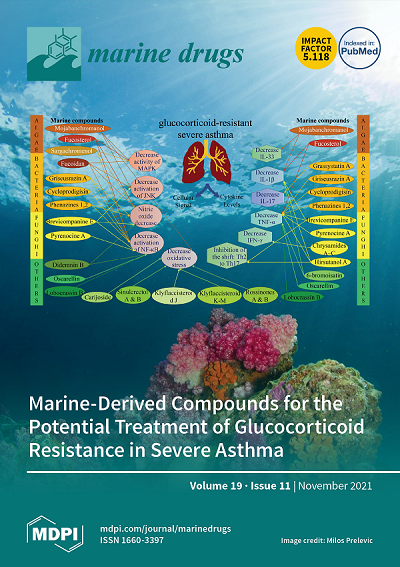Exploring the Antimicrobial Potential of Hallachrome, a Defensive Anthraquinone from the Marine Worm Halla parthenopeia (Polychaeta)
IF 4.9
2区 医学
Q1 CHEMISTRY, MEDICINAL
引用次数: 0
Abstract
Antimicrobial resistance is a critical global health issue, with rising resistance among bacteria and fungi. Marine organisms have emerged as promising, but underexplored, sources of new antimicrobial agents. Among them, marine polychaetes, such as Halla parthenopeia, which possess chemical defenses, could attract significant research interest. This study explores the antimicrobial properties of hallachrome, a unique anthraquinone found in the purple mucus of H. parthenopeia, against Gram-negative bacteria (Escherichia coli ATCC 25922, Pseudomonas aeruginosa ATCC 9027), Gram-positive bacteria (Enterococcus faecalis ATCC 29212, Staphylococcus aureus ATCC 6538, Staphylococcus epidermidis ATCC 12228), and the most common human fungal pathogen Candida albicans ATCC 10231. Antibacterial susceptibility testing revealed that Gram-negative bacteria were not inhibited by hallachrome at concentrations ≤2 mM. However, Gram-positive bacteria showed significant growth inhibition at 0.12–0.25 mM, while C. albicans was inhibited at 0.06 mM. Time-kill studies demonstrated dose-dependent growth inhibition of susceptible strains by hallachrome, which exerted its effect by altering the membrane permeability of C. albicans, E. faecalis, and S. epidermidis after 6 h and S. aureus after 24 h. Additionally, hallachrome significantly reduced biofilm formation and mature biofilm in S. aureus, E. faecalis, and C. albicans. Additionally, it inhibited hyphal growth in C. albicans. These findings highlight hallachrome’s potential as a novel antimicrobial agent, deserving further exploration for clinical experimentation.探索海洋蠕虫 Halla parthenopeia(多毛目)中的一种防御性蒽醌--哈拉铬的抗菌潜力
抗菌药耐药性是一个严重的全球健康问题,细菌和真菌的耐药性不断上升。海洋生物已成为新型抗菌剂的前景广阔但尚未充分开发的来源。其中,具有化学防御能力的海洋多毛目环节动物(如 Halla parthenopeia)可能会引起重大的研究兴趣。本研究探讨了哈拉醌的抗菌特性,哈拉醌是一种独特的蒽醌化合物,存在于哈拉醌的紫色粘液中。对革兰氏阴性菌(大肠杆菌 ATCC 25922、铜绿假单胞菌 ATCC 9027)、革兰氏阳性菌(粪肠球菌 ATCC 29212、金黄色葡萄球菌 ATCC 6538、表皮葡萄球菌 ATCC 12228)以及最常见的人类真菌病原体白色念珠菌 ATCC 10231 的抗菌特性。抗菌药敏感性测试表明,浓度≤2 mM 的哈拉色素对革兰氏阴性菌没有抑制作用。不过,革兰氏阳性菌在 0.12-0.25 毫摩尔浓度下的生长受到明显抑制,而白僵菌在 0.06 毫摩尔浓度下受到抑制。时间杀灭研究表明,哈拉铬对易感菌株的生长抑制是剂量依赖性的,在 6 小时后,哈拉铬通过改变白僵菌、粪大肠杆菌和表皮葡萄球菌的膜渗透性产生作用;在 24 小时后,哈拉铬通过改变金黄色葡萄球菌的膜渗透性产生作用。此外,它还能抑制白僵菌的菌丝生长。这些发现凸显了哈拉铬作为一种新型抗菌剂的潜力,值得在临床实验中进一步探索。
本文章由计算机程序翻译,如有差异,请以英文原文为准。
求助全文
约1分钟内获得全文
求助全文
来源期刊

Marine Drugs
医学-医药化学
CiteScore
9.60
自引率
14.80%
发文量
671
审稿时长
1 months
期刊介绍:
Marine Drugs (ISSN 1660-3397) publishes reviews, regular research papers and short notes on the research, development and production of drugs from the sea. Our aim is to encourage scientists to publish their experimental and theoretical research in as much detail as possible, particularly synthetic procedures and characterization information for bioactive compounds. There is no restriction on the length of the experimental section.
 求助内容:
求助内容: 应助结果提醒方式:
应助结果提醒方式:


